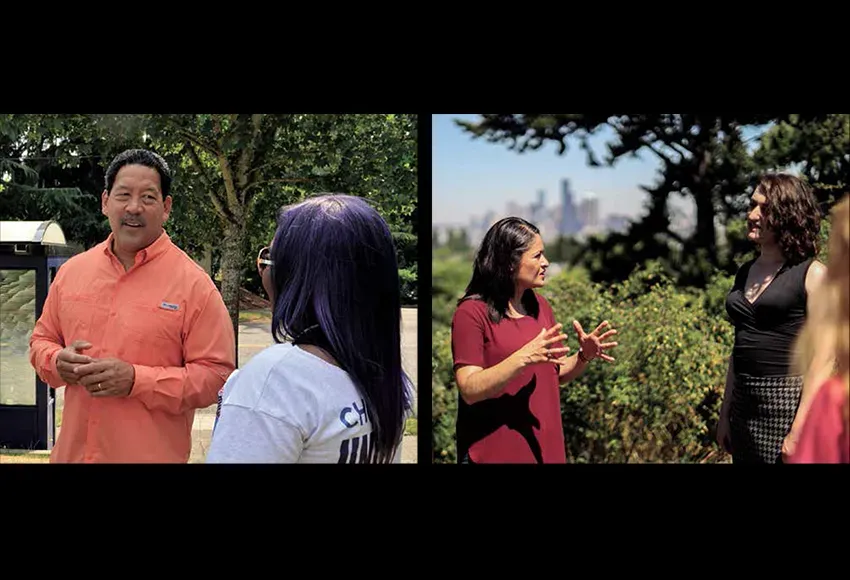Former Seattle City Council member Bruce Harrell will face off against current Council President Lorena Gonzalez for mayor of Seattle in the November general election.
Early returns in the August 3 primary election showed Harrell and Gonzalez with commanding leads over potential opponents. According to the initial returns posted by King County Elections, Harrell ran first in the field, with more than 38% of the votes, and Gonzalez came second with almost 29%.
Housing activist Colleen Echohawk ran a distant third, with somewhat more than 8%, in spite of a vigorous and well-financed campaign. Openly LGBTQ candidate Andrew Grant Houston pulled 2.6% of the votes.
In all, 14 candidates ran for mayor.
Harrell drew endorsements from a number of former officeholders, including openly Gay state Sen. Jamie Pedersen (D-43) and former City Councilmember Tom Rasmussen. He also won the support of public figures in the African American community (former King County Councilmember Larry Gossett, for example) and Asian–Pacific Islander community (like former City Councilmember David Della).
Gonzalez drew support from organized labor, with endorsements from MLK Labor – King County's central labor council – and many public- and private-sector unions. She was also endorsed by Bernie Sanders, Seattle-area Rep. Pramila Jayapal, and former HUD Secretary Julian Castro.
"Our campaign's message of unity, accountability, and action clearly resonated with voters," Harrell said in an election night statement.
"I'm looking forward to taking this energy into the general election and into office as mayor, as we unite our city and address the challenges facing Seattle."
González was more exuberant. "Seattle voters are sending a powerful message, and that is a message of change," she shouted to a jubilant crowd at her Georgetown election night celebration.
The mayor's office became an open race when incumbent Jenny Durkan – embattled by massive anti-police demonstrations in the wake of George Floyd's murder – announced she would not run for reelection.
Seattle City Council
In the race for at-large Seattle City Council position 8, the incumbent Teresa Mosqueda held a huge lead after the initial results were announced on election night.
Mosqueda pulled in nearly 55% of the votes. Her nearest opponent, Kenneth Wilson, drew only 18%. Mosqueda has held the seat since 2016.
Prior to her election, she was political director for the Washington State Labor Council. Wilson is a civil engineer and owns his own consulting firm.
In at-large Position 9 – the seat Lorena Gonzalez vacated to run for mayor – voters in November will choose between brewery owner Sara Nelson and Queer activist Nikkita Oliver.
Nelson ran first, with just over 42% of the votes; Oliver was second, at 35%.
Nelson campaigned as a champion of the city's small businesses but opposes measures like the Jump Start program – which Mosqueda championed from her City Council seat – that would require big businesses to foot the bill for the city's social safety net.
Oliver has been an outspoken local activist, opposing the new youth jail and calling for diverting funds from Seattle police to community-based public safety programs. They ran for mayor in 2017, narrowly missing a spot in the general election.
Nelson has been endorsed by a similar constellation of forces as Bruce Harrell. Oliver won the endorsements of MLK Labor, many local unions, and Pride At Work, and LGBTQ labor organization affiliated with the AFL-CIO.
Seattle City Attorney
Three-term City Attorney Pete Holmes may be looking at the end of the trail if trends revealed on primary night hold in the general election.
In a very tight three-way race, Holmes was running only slightly ahead of challenger Nicole Thomas-Kennedy for a spot in the November general election. Leading the pack was challenger Ann Davison.
Though undoubtedly popular during his previous terms, Holmes has been labeled "soft on crime" by conservatives and "tough on the homeless" by progressives.
Of the three candidates, leader Davison is the law-and-order candidate and the only registered Republican with any chance of winning a citywide office. Thomas-Kennedy is a former public defender and police abolitionist who has accused Holmes of using his office to prosecute people for crimes of poverty.
County Executive
Incumbent County Executive Dow Constantine will face state Sen. Joe Nguyen (D-36) in the November general election.
In the first drop of numbers form King County Elections, Constantine was well ahead of the field, with more than 53% of the votes. Nguyen came second, with just short of 30%.
Republican Bill Hirt trailed badly, at 12%. Perennial candidate Goodspaceguy – who runs on a platform of space colonization – garnered 3% of the votes.
Three-term incumbent won endorsements from MLK Labor and many individual union locals, although Nguyen won the support of Metro bus drivers (ATU 587) and UAW 4121, representing UW researchers and teaching assistants.
What next?
King County Elections will continue to update its reports at least once a day until all ballots have been counted. The first numbers released usually reflect the first ballots received by election officials, and these are usually thought to be older, whiter, more affluent voters, so that later results often skew in favor of more progressive candidates.
Given the wide margins enjoyed by the top-tier candidates in almost every race, though, it's unlikely new ballot drops will change most of the races. The only exception is the tight three-way race for Seattle city attorney, where incumbent Holmes might well be edged out of the general election by progressive challenger Thomas-Kennedy.
The top two vote-getters go on to the general election in November.


